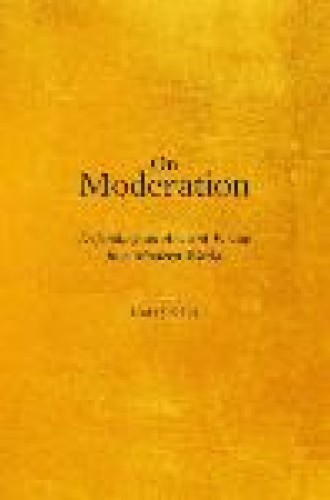On Moderation:Defending anAncient Virtue in a Modern World
Some years ago a young Southern Baptist minister in North Carolina, identifying her political stance in that church, remarked: “I am not a flaming moderate.” But moderation seldom bursts into flame. It’s one of the quiet virtues. These days in Washington, as the entire Republican Senate minority votes as a bloc against most things Democratic, the word moderate is a word of hope—hope for a legislative justice that can emerge from compromise and debate of issues inside and between the parties.
Philosopher Harry Clor, emeritus professor of political science at Kenyon College, understands that among most religiously committed persons, moderate morality gets bad press. Aristotle, the great classical proponent of moderation, once remarked that a wise philosopher would never run but would instead walk deliberately, refusing to rush into any situation without prudent attention to circumstance and consequence. One might contrast Aristotle’s wise philosopher with the father in Jesus’ parable of the prodigal son: “He ran and embraced him.” Not much moderation there.
Lest any potential reader dismiss Clor’s book as merely a critique of all human behavior worth calling radical, I summarize his work as a disciplined exercise in ethical honesty. Clor knows that ethics is seldom a matter of thinking and doing only one thing and that the virtue of moderation nests among other virtues, principles, values and convictions. He argues for pluralism in ethics, politics and personal life, and in his ruminative, even leisurely fashion, Clor draws readers into considering our human need for “balance or proportionality, recognition of limits, some capacity for disinterestedness” in all our personal and social relations.
In his opening chapter on politics, Clor sides with Aristotle and Edmund Burke in reminding us that politics is inherently a clash between groups of humans who swear by different authorities, interests and goals. In his middle chapter on personal moderation, he reminds us that it takes more than one goal, principle or commitment to live a human life. You are in trouble if you think that humans live “by bread alone” (Luke 4:4) or that humans can live without bread. On the other hand, in his final chapter, on the “tempered mind,” Clor offers some powerful arguments against the radical pluralism of a postmodernism that reduces every claim of truth to its roots in class, power and the particularities of history.
Most of all, these pages call for honest reflection on the inner preferences and outer circumstances of human life, social and personal, that will set us all up for some earnest debate, for conversation in our minds and between our minds. That conversation can deliver us from intellectual totalitarianism, from bondage to one authority, one value, one rush to the confession, “Here I stand.” Not even Luther’s famous resort to this confession came from a single-minded theology and ethic that had no regard for the many dimensions of the biblical word. How often in modern Christian social ethics have we been reminded that justice without love and love without justice are both deficient?
In a section that demonstrates Clor’s respect for experience, he reflects on erotic love, conceding from the start that this is one area in which few of us celebrate moderation. Presenting a test case for ethical and commonsense pluralism, this chapter reminds us that a fulfilling sexual relationship entails more than one impulse to consummation. For sex to be fulfilling, passion needs wisdom and wisdom needs passion. One without the other leads to many a disastrous relationship.
Clor practices what he teaches by tolerating the varieties of human experience and belief while carefully avoiding any idolizing of tolerance, which alone cannot build a society. “Perhaps,” writes Clor, “a philosophy of moderation can serve to reduce the distance between belonging to oneself and commitment to others by calling attention to a connection between them.”
In reading this book, I was often reminded of Bonhoeffer’s insistence that we Christians must reckon with life “in many dimensions.” Clor makes it clear that attention to plural principles and circumstances is not a formula for being set adrift in a sea of uncertainties. We do bring more than one certainty to our decisions, and often in the puzzling conflict between them, we do reach out for some overriding certainty that cuts the knot, that authorizes a compromise or a way to discriminate between the right road and roads not taken.
Clor knows, with Barth and Bon hoeffer, that for religiously minded folk, a rational, intellectual way through is not finally available. Secularists tend to cut through conflicting principles by appealing to an overriding principle, value or fact, and they may call that override rational. But for Christians caught in such a conflict, trusting any abstract value as the final ethical authority leaves no room for the authority of the Holy Spirit. When we “walk in the Spirit” (Gal. 5:16), we depend finally on a Presence who helps us in the midst of our pluralistic wrestling.
In many ways Clor does in this slim book exactly what philosophers do best: he sharpens our awareness of the hidden, unconscious assumptions we often bring to our conscious decision making. Clor’s readable pages are an antidote to both moralistic absolutism and amoral relativism and are written in a style that is ruminative and well illustrated and does not talk down to the nonspecialist. This book is valuable because it doesn’t simply celebrate moderation, but locates moderation among the other virtues.





